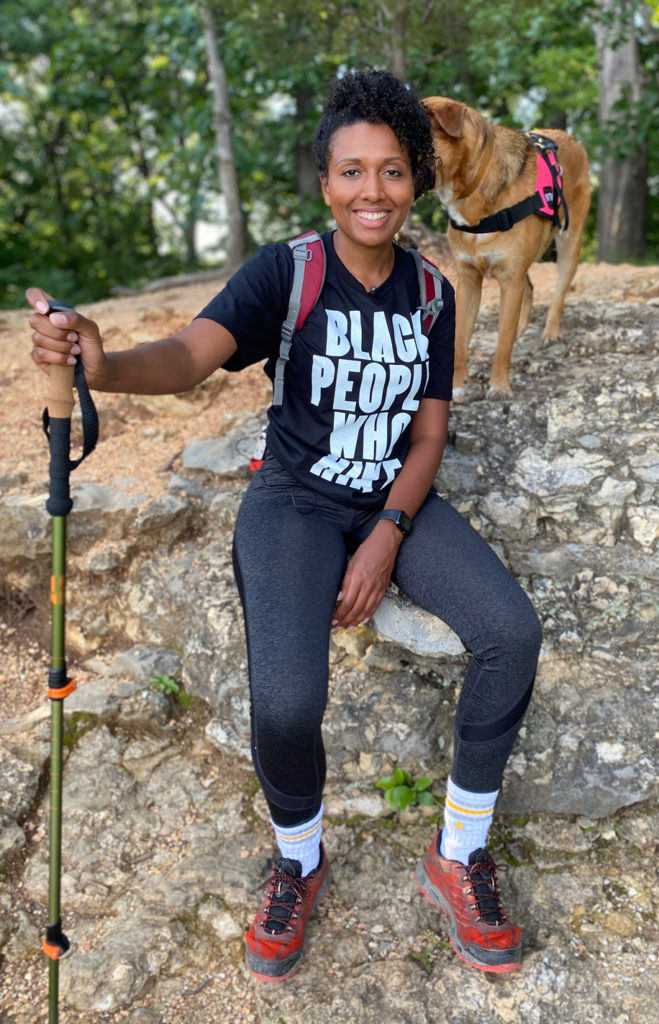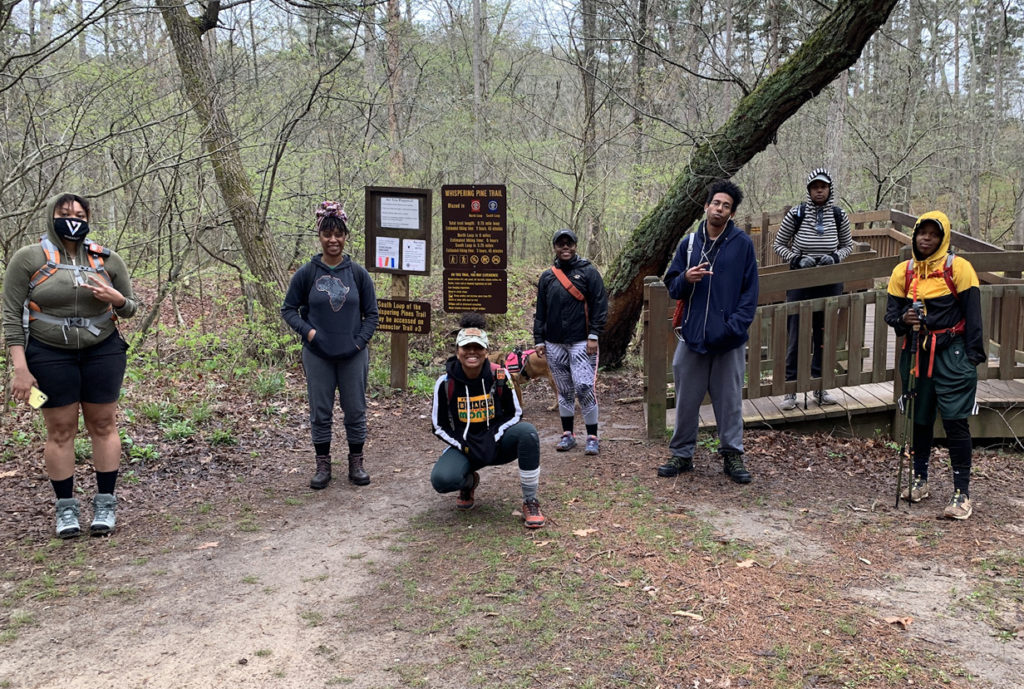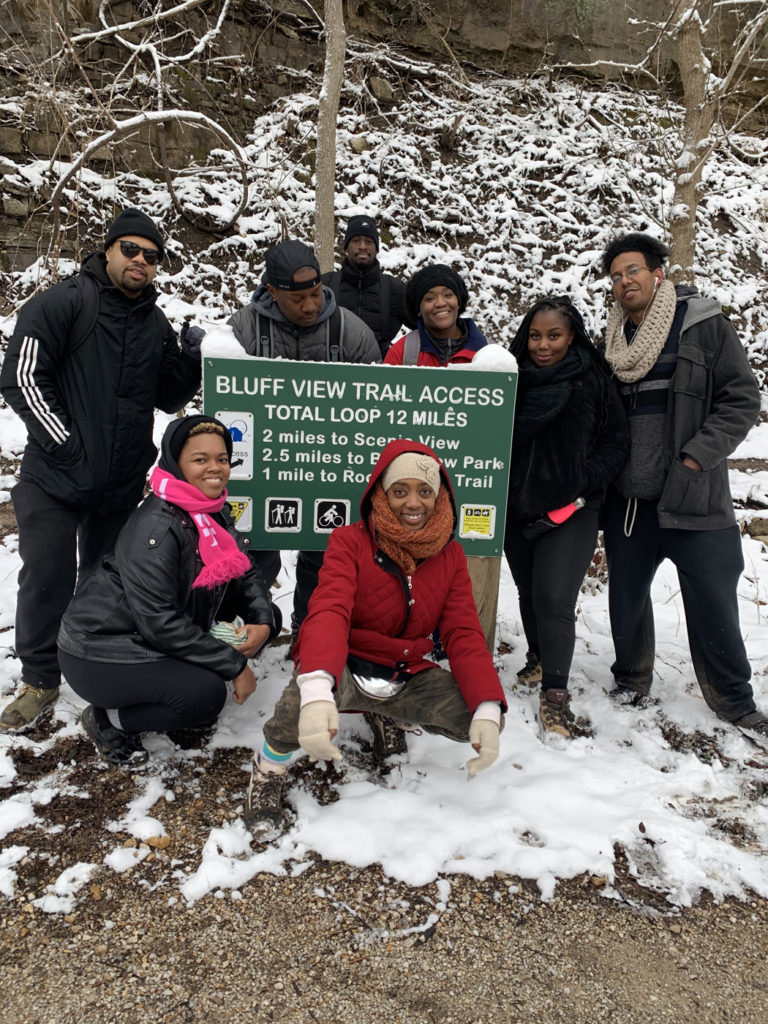
Debbie Njai’s passion for hiking began last year when a friend invited her to hit the trails for the first time.
As co-director for seven family-owned Little Caesars Pizza restaurants in the St. Louis area, Njai’s work week is busy and can often be stressful. That first experience walking in the forest was life changing because she immediately experienced a peace of mind that was calming and relaxing, yet exhilarating.
Weekly hikes became a part of her life.
She wanted to share the discovery with others. This led to her forming “Black People Who Hike,” a group that encourages people of color to get outside and engage in healthy activities, while also building a sense of comradery. The first group hike began with only two people, but has grown exponentially, since then.
Currently, BPWH is in the middle of the first “Black Hikers Week,” which has been a virtual experience, with many people joining in and connecting on social media.

“The support this week has been more than we could ask for,” Njai said.
Just search #blackhikersweek on Instagram or Facebook to get a good idea of the impact it has made.
Black Hikers Week was formed through a collaboration between Njai, Zenovia Stephens, founder of Black Kids Do Hike, in Huntsville, Alabama, and Nailah Blades Wylie, who founded We Color Outside, in Sandy, Utah, all three who are passionate about the black hiking community.
“We all came together, basically, as strangers, and facilitated planning over Zoom calls, and within two weeks, Black Hikers Week was born,” Njai said.
 The primary goal of BHW is to highlight individuals and communities working to change the narrative by shining a spotlight on those already involved in the hiking community, and inspiring others to do something new.
The primary goal of BHW is to highlight individuals and communities working to change the narrative by shining a spotlight on those already involved in the hiking community, and inspiring others to do something new.
Over time, Njai herself has found that her newfound passion helped her balance a demanding full-time job and relieved her bouts of seasonal depression.
“Hiking has cured my depression. When I changed my diet to plant-based a couple of years ago, I felt a big difference in mood and anxiety, but some still lingered. Since I started hiking, I don’t get depressed, I don’t get down and I rarely have anxiety,” she said.

Yes, the group hiked through the winter, and though she usually hates cold weather, Njai said walking in cooler weather (sometimes even down to the mid-20s), offered yet another enjoyable – albeit different – experience.
“We even had first-time hikers come out in the snow,” she said.
When she first started hiking, she began to realize the lack of representation of Black hikers, and wanted to inspire others to get out in nature, too. That’s when Black People Who Hike was formed.
“Everyone I’ve brought out has this ‘ah-hah’ moment about an hour into the hike,” she said.
She began doing some research, and soon realized there is a lot of scientific data on the mental, physical and spiritual benefits of hiking.
 “I stumbled across forest bathing or ‘shinrin-yoku,’ and realized that countries such as Japan have been using nature to heal as an alternative form of medicine for a long time. One of the big things for me was to discover that spending time in the forest not only heals anxiety, depression and high blood pressure, but also increases our Natural Killer or NK cells, which are white blood cells that fight off cancer cells,” she said.
“I stumbled across forest bathing or ‘shinrin-yoku,’ and realized that countries such as Japan have been using nature to heal as an alternative form of medicine for a long time. One of the big things for me was to discover that spending time in the forest not only heals anxiety, depression and high blood pressure, but also increases our Natural Killer or NK cells, which are white blood cells that fight off cancer cells,” she said.
Having friends who deal with anxiety and depression, her own previous seasonal depression, and having a family member who just recently finished chemo treatment, made it all hit home for Njai.
“Once I really became aware of the impact that hiking could have on the Black community and the position that I was in to affect change, I knew that Black People Who Hike was my life’s purpose!” she said.
The hikes are free for participants, and she plans to keep them that way. She does it because she is passionate about it.
“I’ve thought about charging, but it would take away from what I’m trying to accomplish. Hiking is free, and something that should remain free,” she said. “This is a movement. This is about getting our people outside, back in nature to live happy and healthy lives.
“I promise I get paid though. I get paid in energy. I get paid in love. I get paid in heartfelt feedback from people who need this. Every single week someone reaches out to me and expresses how this group and hiking has positively impacted their lives. That’s the best thing I could ask for,” she added.  Njai’s dog, Brownie, accompanies her on nearly every hike.
Njai’s dog, Brownie, accompanies her on nearly every hike.
“Brownie was there on my first hike with me when she was 9 months old. I remember we celebrated her first birthday in November 2019, during a hike,” Njai said. “Everyone really loves her, and she has contributed a lot to the joy of the group.”
During the pandemic, people hiked virtually, or when back on the trails, wore masks, used hand sanitizer and practiced social distancing. And the few people Njai hiked with during COVID would start an hour earlier than normal to avoid other people.
 People can join in the movement locally by joining one of the meetups, which happen every Sunday, and include some sort of outdoor activity. If it’s not hiking, it may be kayaking, yoga or rock climbing – even camping trips. To stay current on upcoming events, sign up for the email list at blackepeoplewhohike.com, or follow blackpeoplewhohike on Facebook or Instagram. For those outside of the St. Louis area, BPWH will soon be releasing a black hiking directory listing other black hiking organizations across the globe.
People can join in the movement locally by joining one of the meetups, which happen every Sunday, and include some sort of outdoor activity. If it’s not hiking, it may be kayaking, yoga or rock climbing – even camping trips. To stay current on upcoming events, sign up for the email list at blackepeoplewhohike.com, or follow blackpeoplewhohike on Facebook or Instagram. For those outside of the St. Louis area, BPWH will soon be releasing a black hiking directory listing other black hiking organizations across the globe.
“We just want to encourage everyone – wherever you are – to get outside and get active!” Njai said.
There are more than 30 organizations across the nation that were created for black hikers by black hikers, and the creators of Black Hikers Week will lead a discussion with leaders from other Black outdoor organizations during a virtual town hall meeting on Friday. To wrap up the week in the St. Louis Area, BPWH will host a hike on Saturday, June 27, at Don Robinson State Park in Jefferson County. The same day, participants from around the country and the world are invited to join a virtual hike.
For more information, visit blackpeoplewhohike.com.







I honor free speech, but why isn’t this organization devoted to People Who Hike? Why doesn’t this organization want to hike with Latinos, Asians, Native Americans, white people? Why not spread a message that hiking benefits all people? Why not be friends with everybody?
Segregation practiced in forests –I can’t think of anything more depressing. The so-called “progressive” Left that promotes tribalism will only fuel extremism.
Signed A Democrat
Hi Teri, Follow them on Instagram to learn about the name and purpose. However, they will accommodate everyone.